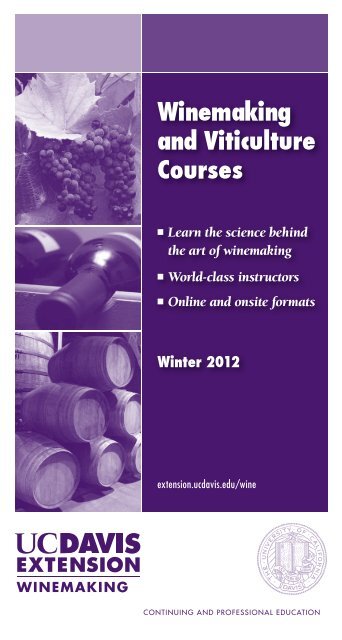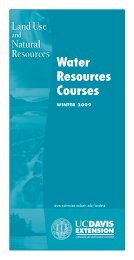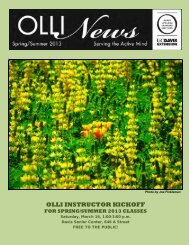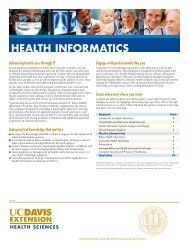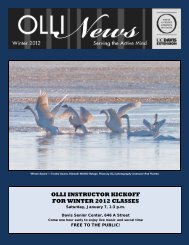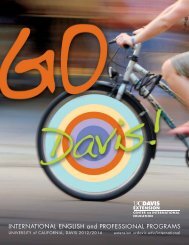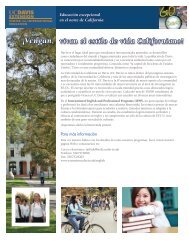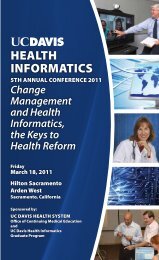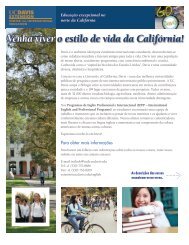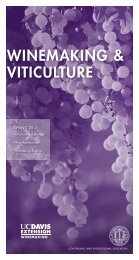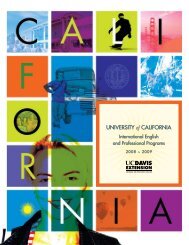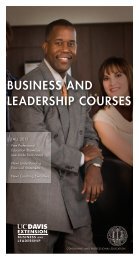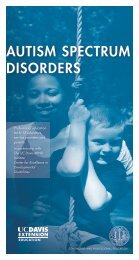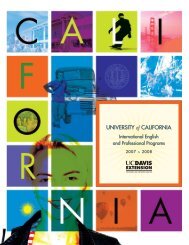Winemaking and Viticulture Courses - UC Davis Extension
Winemaking and Viticulture Courses - UC Davis Extension
Winemaking and Viticulture Courses - UC Davis Extension
- No tags were found...
Create successful ePaper yourself
Turn your PDF publications into a flip-book with our unique Google optimized e-Paper software.
Introduction to WineChemistryNoncredit.Designed for individuals with a winemakingbackground but no formal training in chemistry,this weekend program provides insights intothe interplay of chemical reactions that occurin wine <strong>and</strong> winemaking. An underst<strong>and</strong>ing ofsuch reactions establishes the necessary backgroundfor making informed decisions on wineprocessing. This is a course in wine chemistry<strong>and</strong> is not intended as a course in methods ofwine analysis. Learn about the importance ofpH chemistry in winemaking, titratable acidity,buffer capacity <strong>and</strong> equilibriums in wine,fermentation end products (including ethanol<strong>and</strong> volatile acidity) <strong>and</strong> other critical topicsassociated with wine chemistry. Please do notbring wine to class. The syllabus includes a takehomeproblem set.Please note: This course does not satisfy thechemistry requirement for the <strong>Winemaking</strong>Certificate Program.MICHAEL S. RAMSEY is the teaching laboratorymanager for the Department of <strong>Viticulture</strong><strong>and</strong> Enology, <strong>UC</strong> <strong>Davis</strong>, where he is responsiblefor assisting students in planning <strong>and</strong> coordinatingdepartment laboratory classes. He is awinemaker for a small vineyard operation inWinters, Calif., as well as a judge at regionalbrewing competitions.■■2 meetings.■■Feb. 25–26: Sat.–Sun., 8:30 a.m.–4:30 p.m.■■<strong>Davis</strong>: Da Vinci Building, 1632 Da Vinci Ct.■■Technical requirements: An active emailaddress is requested upon enrollment fordistribution of post-course materials.■ ■ $280. Fee includes course materials <strong>and</strong> twolunches. Enroll in section 113VIT207.Also of Interest:Health <strong>and</strong> Safety for WineryOperations: An OverviewMake your workplace safer by learningbest practices <strong>and</strong> OSHA requirementsrelevant to winery operations. Take homeinformation vital for winery managers <strong>and</strong>their safety representatives. Topics relatedto safety in vineyards will not be coveredin this course.■■Feb. 22: Wed., 8:30 a.m.–5 p.m.■■Sacramento: Sutter Square Galleria,2901 K St.■ ■ $390. Includes course materials <strong>and</strong>morning refreshments. Enroll in section113HSD516.Introduction to WinerySanitationNoncredit.Learn about the exciting world of wine spoilagemicroorganisms <strong>and</strong> proper winery sanitationin this course intended for members of thewine industry <strong>and</strong> advanced home winemakers.Topics include restricting the introduction ofspoilage organisms entering the winery as wellas the control of internal reservoirs harboringchronic infections. Explore current methods tomanage microbial load as well as alternatives totraditionally used chemistries. Emphasis is onthe establishment of monitoring protocols thatquantify the efficacy of cleaning protocols.It is recommended that you bring a bag lunchdue to the facility location <strong>and</strong> limited foodservice on campus.JAMES A. BROWN. See bio at left■■1 meeting.■■March 29: Thurs., 9 a.m.–4 p.m.■■<strong>UC</strong> <strong>Davis</strong>: 1127 North, Robert MondaviInstitute for Wine & Food, Old <strong>Davis</strong> Rd.■ ■ $185. Enroll in section 113VIT211.Wine MicrobiologyWorkshopNoncredit.Explore the microscopic world at work whengrapes become wine. During this intensivetwo-day class, members of the wine industrywill receive microscope training <strong>and</strong> practicalexercises for identifying wine microorganisms.Lecture topics include yeast <strong>and</strong> malolacticbacteria strains, starter cultures, fermentations<strong>and</strong> winery sanitation. In the lab, explore theuse of sterile techniques, plating of cultures,isolation of microorganisms, use of countingchambers <strong>and</strong> biofilm assays. You will spend aconsiderable amount of time on the microscope.Enrollment is limited due to restrictions onlab space. Early enrollment is encouraged. It isrecommended that you bring a bag lunch due tothe facility location <strong>and</strong> limited food service oncampus.JAMES A. BROWN. See bio at left■■2 meetings.■■March 26–27: Mon.–Tues., 9 a.m.–4 p.m.■■<strong>UC</strong> <strong>Davis</strong>: 1127 North, Robert MondaviInstitute for Wine & Food, Old <strong>Davis</strong> Rd.■ ■ $475. Enroll in section 113VIT209.
Introduction to WineAnalysisNoncredit.Examine the basics of wine analysis for commercial<strong>and</strong> advanced home wine production.Designed for serious winemakers, winery labemployees <strong>and</strong> small commercial winemakers,this one-day class combines short lecture <strong>and</strong>h<strong>and</strong>s-on experience. Gain practice with, <strong>and</strong>examine the limitations of, each analysis. Workin small groups, with university wines, to gainfamiliarity with these common lab analyses: free<strong>and</strong> total SO 2by Ripper <strong>and</strong> Aeration-Oxidation,volatile acidity distillation, titratable acidity,pH, malolactic paper chromatography, residualsugar by pill test <strong>and</strong> percentage of alcohol byebulliometer. Some aspects of wine chemistrywill be reviewed as it pertains to each analysis.For optimal underst<strong>and</strong>ing of the results of eachanalysis, it is highly recommended that participantshave previously attended Introduction toWine Chemistry.Due to restricted lab space, the class is limitedto 24 students. Early enrollment is encouraged.Please bring a calculator, notebook, old clothesor lab coat, <strong>and</strong> closed-toed, comfortable shoes(no s<strong>and</strong>als or crocs). Our teaching labs observeOSHA rules. There is no eating or drinking ofany liquids (including water) allowed in the labs.It is recommended that you bring a bag lunchdue to the facility location <strong>and</strong> limited foodservice on campus.MICHAEL S. RAMSEY. See bio on previouspage.■■1 meeting.■■March 10: Sat., 9 a.m.–6 p.m.■■<strong>UC</strong> <strong>Davis</strong>: 1127 North, Robert MondaviInstitute for Wine & Food, Old <strong>Davis</strong> Rd.■ ■ $255. Includes lab supplies. Enroll in section113VIT208.Managing the SmallVineyard INoncredit.The Small Vineyard Series is a quarterly seriesof one-day classes designed for home <strong>and</strong> smallcommercial winegrowers. Classes explore basicprinciples of viticulture <strong>and</strong> practical aspects ofsmall vineyard management, <strong>and</strong> may be takenin any order. Presentations are designed forgrowers with little or no previous experience ingrape growing. This is the first of two classesfocusing on vineyard management practices. Itcovers many of the vineyard activities occurringduring the winter <strong>and</strong> spring monthsincluding planting new vineyards, trainingyoung vines, <strong>and</strong> principles <strong>and</strong> practices ofpruning. Also included are discussions on frostprotection, weed control <strong>and</strong> vineyard floormanagement options.DONNA HIRSCHFELT, M.S., is a retiredviticulture adviser. For 20 years she was aviticulture adviser for <strong>UC</strong> Cooperative <strong>Extension</strong>working in the Central Valley <strong>and</strong> the Sierrafoothills.RHONDA J. SMITH is the <strong>UC</strong> Cooperative<strong>Extension</strong> viticulture farm adviser for SonomaCounty. Her research <strong>and</strong> <strong>UC</strong> Cooperative<strong>Extension</strong> program includes evaluations ofrootstocks <strong>and</strong> clones on yield components<strong>and</strong> fruit composition, pest management <strong>and</strong>vineyard irrigation.■■1 meeting.■■Jan. 28: Sat., 9 a.m.–4 p.m.■■<strong>UC</strong> <strong>Davis</strong>: Room 180, Medical ScienceBuilding, E. Health Science Dr.■ ■ $175. Includes course material <strong>and</strong> lunch.Enroll in section 113VIT205.WineAppreciationIntroduction to SensoryEvaluation of WineNoncredit.Novice enophiles, enhance your critical tastingability <strong>and</strong> learn basic aspects of sensory evaluationoften overlooked in most wine tastings.Study the different components of wine appearance,aroma <strong>and</strong> flavor. Participate in tastingsof doctored wines in blind <strong>and</strong> known tastings.Explore the origins of desirable <strong>and</strong> undesirableflavors of wine <strong>and</strong> the stylistic contributionsof winemaking techniques. Lectures by facultymembers of the world-renowned <strong>UC</strong> <strong>Davis</strong>Department of <strong>Viticulture</strong> <strong>and</strong> Enology will beinterspersed throughout the program. Emphasisis placed on correct use of wine descriptiveterminology. This course is extremely popular<strong>and</strong> enrollment is limited. Early enrollment isencouraged.Note: You must be 21 years of age or older toenroll <strong>and</strong> attend.JOHN BUECHSENSTEIN has been a winemaker<strong>and</strong> wine educator for more than 30 years. Hehas extensive experience making wine in theNapa Valley <strong>and</strong> other wine growing regions ofthe California coast. His passion for wine hastaken him to the wine regions of Bordeaux,Champagne, Paris <strong>and</strong> Rhone Valley in France.■■2 meetings.■■Feb. 18–19: Sat.–Sun., 9 a.m.–4 p.m.■■<strong>Davis</strong>: Da Vinci Building, 1632 Da Vinci Ct.■ ■ $550. Includes two lunches <strong>and</strong> all wine.Enroll in section 113VIT202.
Descriptive Analysis ofWhite & Red Table WinesNoncredit.Smell—not taste—is the human sense thatdetects the overall flavor in wine. Our sense ofsmell is the most acute <strong>and</strong> powerful tool weuse to record our sensory impressions of wine.By training your sense of smell <strong>and</strong> your brain,you can leap from vague hedonic impressions ofwine to more intellectual, analytical responses.Through practice with white <strong>and</strong> red winereference st<strong>and</strong>ards, you can quickly learn thedescriptive language of wine <strong>and</strong> enable yourbrain to accumulate, store <strong>and</strong> recall valuablesensory memories. Scheduled by populardem<strong>and</strong>, this intermediate-level class is offeredto give students who have taken the introductoryclass a chance to further exp<strong>and</strong> their winevocabulary <strong>and</strong> wine tasting abilities. Numerousprepared odor st<strong>and</strong>ards <strong>and</strong> blind tastings ofcommercial wines will be presented to train youhow to describe a wide range of white <strong>and</strong> redwine types. It is highly recommended that youattend Introduction to Sensory Evaluation of Wineor have equivalent experience before enrollingin this course.Note: You must be 21 years of age or older toenroll <strong>and</strong> attend.JOHN BUECHSENSTEIN. See bio at left.■■2 meetings.■■March 17–18: Sat.–Sun., 9 a.m.–4 p.m.■■<strong>Davis</strong>: Da Vinci Building, 1632 Da Vinci Ct.■ ■ $550. Includes two lunches <strong>and</strong> all wine.Enroll in section 113VIT206.<strong>Winemaking</strong>BusinessTasting Room Design<strong>and</strong> ManagementNoncredit.Make your tasting room more profitable <strong>and</strong>memorable with practical, experience-driveninformation that you can start using immediately.Craig Root, a 30-year industry veteran<strong>and</strong> tasting room consultant, provides ideas forachieving tasting room perfection, includinghow to find <strong>and</strong> keep good staff. Learn howto create a profitable wine club <strong>and</strong> designyour room with lighting <strong>and</strong> displays. Exploretasting strategies, special events tips, <strong>and</strong> howto improve your tours <strong>and</strong> trade relations. Therewill also be a special guest lecturer speakingabout social media, websites <strong>and</strong> other strategiesto increase your business. This class is especiallybeneficial for people who are consideringstarting a tasting room or remodeling anexisting one.CRAIG ROOT has more than 30 years of experienceworking with tasting rooms: first as staff<strong>and</strong> successful manager <strong>and</strong> then 17 years as atasting room consultant. As a consultant, he hashelped create more than 60 tasting rooms <strong>and</strong>100 wine clubs throughout the U.S. <strong>and</strong> Canada.He has also analyzed <strong>and</strong> advised dozens ofcurrent operations.PAUL MABRAY has been a leader <strong>and</strong> innovatorfor wine <strong>and</strong> technology for 19 years. As chiefstrategy officer for VinTank, the industry’s onlydigital think tank, he generates innovativeresearch <strong>and</strong> products to help the wine industrysucceed in all things digital.■■1 meeting.■■Feb. 22: Wed., 9 a.m.–4:30 p.m.■■<strong>Davis</strong>: Da Vinci Building, 1632 Da Vinci Ct.■ ■ $195. Includes course materials <strong>and</strong> lunch.Enroll in section 113VIT204.FOr more information or to enrollCall <strong>UC</strong> <strong>Davis</strong> <strong>Extension</strong> at (800) 752-0881, (530) 757-8777from <strong>Davis</strong> or Woodl<strong>and</strong>, email extension@ucdavis.edu or visitour website. extension.ucdavis.edu/wineNot produced at state expense<strong>UC</strong> <strong>Davis</strong> <strong>Extension</strong> is a self-supporting, nonprofit organization fundedby course fees, grants <strong>and</strong> contracts.The University of California does not discriminate in any of its policies,procedures or practices. The university is an affirmative action/equalopportunity employer.Tax deductibility of educational expensesEducational expenses—including registration fees, travel, meals <strong>and</strong>lodging—may be deductible if they maintain or improve professionalskills or meet the express requirement of an individual’s employer.Contact a certified public accountant for more information, or visitwww.irs.gov/taxtopics.General InformationIf your plans changeRequests to withdraw from a course must be received before the lastmeeting of the course. Following the proper withdrawal procedurewill ensure an appropriate grade assignment. Refund requests forshort courses (five or fewer meetings) will be approved, less a $30processing fee, if the request is received seven calendar days beforethe course begins. For quarter-long courses (more than five meetings),refunds will be approved, less a $30 processing fee, if the request isreceived before the second meeting of the course.Requests for withdrawals or refunds may be made by phone, faxor in writing. Please include the student’s name, course title <strong>and</strong>course section number. For information about other alternatives (e.g.,transferring to another course or sending a substitute), call <strong>UC</strong> <strong>Davis</strong><strong>Extension</strong> at (800) 752-0881. <strong>UC</strong> <strong>Davis</strong> <strong>Extension</strong> reserves the rightto cancel or reschedule courses <strong>and</strong> to change instructors. If a courseis canceled or rescheduled, you may request an official transfer toanother course or a refund. Every reasonable effort will be made tonotify enrollees of changes or cancellations.
EnrollinG is Easy!By mail complete this form <strong>and</strong> send it to the Registration Office, <strong>UC</strong> <strong>Davis</strong> <strong>Extension</strong>,University of California, 1333 Research Park Drive, <strong>Davis</strong>, CA 95618-4852.By phone call toll free (800) 752-0881. From <strong>Davis</strong> or Woodl<strong>and</strong> call (530) 757-8777.Please have your Visa, MasterCard, American Express or Discover account number h<strong>and</strong>y.1. Yes! Please enroll me in the following course(s):Title Section numberTitle Section number2. Customer information:❏ Mr. ❏ Mrs. ❏ Ms.Name$Fee$FeeCurrent position/job title Social Security number*Important: Where would you like to receive mail? ❏ work ❏ home (Please fill in all blanks below.)AddressCity State ZIPEmployer name( ) ( )Daytime telephone Evening telephoneEmail If you do not wish to receive periodic email about <strong>UC</strong> <strong>Davis</strong> <strong>Extension</strong>courses <strong>and</strong> programs in your area of interest, please check this box ❏ .Please add info@ucde.ucdavis.edu to your address book or safe list to ensure that our emails are delivered properly.*<strong>UC</strong> <strong>Davis</strong> <strong>Extension</strong> is required by federal law to report your Social Security Number (SSN) <strong>and</strong> other pertinent information to the Internal Revenue Service pursuantto the reporting requirements imposed by the Taxpayer Relief Act of 1997. <strong>UC</strong> <strong>Davis</strong> <strong>Extension</strong> also will use the SSN you provide to verify your identity. SSN disclosureis m<strong>and</strong>atory. This notification is provided to you as required by the Federal Privacy Act of 1974.If your plans change. Requests to withdraw from a course must be received before the last meeting of the course. Following the proper withdrawalprocedure will ensure an appropriate grade assignment. Refund requests for short courses (five or fewer meetings) will be approved, less a $30 processingfee, if the request is received seven calendar days before the course begins. For quarter-long courses (more than five meetings), refunds will be approved, lessa $30 processing fee, if the request is received before the second meeting of the course.Requests for withdrawals or refunds may be made by phone, fax or in writing. Please include the student’s name, course title <strong>and</strong> course section number.For information about other alternatives (e.g., transferring to another course or sending a substitute), call <strong>UC</strong> <strong>Davis</strong> <strong>Extension</strong> at 1-800-752-0881. <strong>UC</strong> <strong>Davis</strong><strong>Extension</strong> reserves the right to cancel or reschedule courses <strong>and</strong> to change instructors. If a course is canceled or rescheduled, you may request an officialtransfer to another course or a refund. Every reasonable effort will be made to notify enrollees of changes or cancellations.BY FAX at (530) 757-8558. If you are enrolling with a company purchase order, please fax a completed enrollment form along with a copy of thepurchase order. For security purposes we can no longer accept credit card payments via fax.IN PERSON at our Registration Office, 8:30 a.m.–4:30 p.m., 1333 Research Park Drive, <strong>Davis</strong>.Online at extension.ucdavis.edu/wine3. Payment information:❏ Enclosed is a check payable to <strong>UC</strong> Regents.❏ Enclosed is a company purchase order (a complete enrollment form, or all information requested on theenrollment form, must be included with purchase orders).❏ Please charge Visa/MasterCard/American Express/Discover:Account number ExpiresName of cardholder Authorized signature 113123Credit card verification number :__________ The CCV is the last three digits of the number printedon the back of your credit card; for American Express it is the last four digits of the number printed onthe front of the card). For Payment Plan Agreement, please call (530) 757-8895.4. Important! Key code: ___ ___ ___ ___ ___ ___ ___ ___For efficient processing of your enrollment, please fill in this code as it appears on your mailing label,whether or not it is addressed to you. If you enroll by phone, please be prepared to provide this code to yourcustomer service representative. Also include it on all purchase orders.<strong>UC</strong> <strong>Davis</strong> <strong>Extension</strong>University of California1333 Research Park Drive<strong>Davis</strong>, CA 95618-4852Key Code1 1 3 1 2 3 - Z ZNonprofit Org.U.S. PostagePAID<strong>UC</strong> <strong>Davis</strong>


